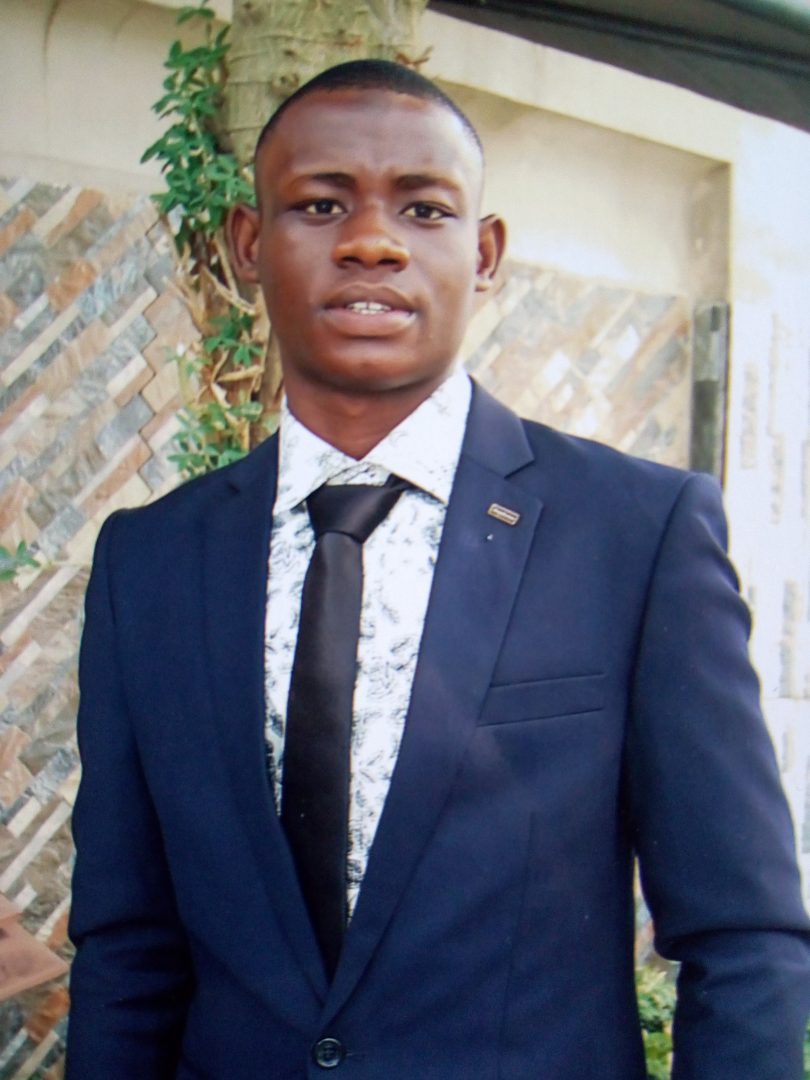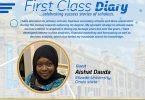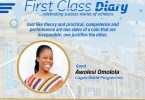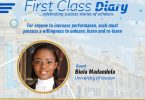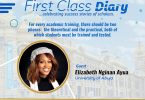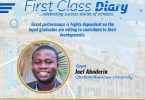Identify Your Areas of Competence, Passion and Focus Before Graduating!
Hello everyone! How have you been faring? Trust you have all been staying safe. It is another Monday and I am excited. Mondays are for celebrating success stories of scholars.
Today, as we wrap up the month with another episode, I present to you, AbdulAzeez Sodiq Olawale, an Economist from Lagos State University.
Sodiq believes that as a student, you should identify your areas of competence, passion and focus before graduating
In his words,
The mark of a true visionary is his ability to imagine the future and act on it, yielding great results in the process and impacting on humanity
Enjoy!
Abigael Ibikunle of Edugist: Please share with Edugist, a little about your background.
AbdulAzeez Sodiq: My name is AbdulAzeez Sodiq Olawale, the first son and child of a middle-income family of four. I am an indigene of Osun State, born and breed in Iba/Iba new site. It is a rural area within Ojo Local Government area axis of Lagos State.
I was privileged to attend Al-Murtadawiyyah Islamic foundation for my primary education. And Iqrah international school for my secondary education.
Then, I proceeded to the prestigious Lagos State University, LASU Ojo, where I obtained a Bachelor of Science degree.
AI: Was there any motivating factor(s) that influenced your choice of discipline and institution?
AS: Being a student of a seasoned and high ranked university was what I’ve always wanted. Still, I wasn’t oblivious to the fact that my parents could not afford a higher institution with high tuition fee.
During my last days at high school, I had aimed to attend a university. Polytechnic or college of education was out of it for me.
Hence, I was advised by my hero (Mr AbdulAzeez – my dad) to attend Lagos State University. He believed that would reduce other costs associated with studying. It would also avoid a negative influence on the family’s financial strength. Although, this is far below what I wanted, I had to respect my father’s decision.
On the other hand, I had envisaged becoming a chartered Accountant since my accounting classes as a commercial class student in secondary school. I practically had interest in all my core courses such as economics, commerce among others.
Hence, I chose to study Economics, being one of the subjects I excelled in, rather than accounting. This was because, Lagos State University had not been accredited for accounting, as at that date I registered for the JAMB examination.
Although, studying economics was not a big deal to me. I had thought, since it’s one of my best subjects in high school, it should be a walk over. Also, I had learnt that ‘Economists are the backbone of the economy of every nation’. This motivated my choice of discipline.
Also, my economics teacher (Mr Ajayi) made me understand that studying accounting will not automatically make me a chartered accountant. He said a certification from relevant bodies will do.
Thus, I chose to study Economics, obtain a certification in accounting. I started out on my journey to be; An Economist and A Chartered Accountant – that’s super cool, I said to myself then.
Hence, I would be able to integrate my knowledge of economics and accounting to contribute to business opportunities in my home country and globally.
AI: There are two major skills that every student must possess: COMPETENCE and PERFORMANCE. While competence revolves around skill acquisition, performance is much more concerned about skills application. It is believed that most graduates are competent because their academic performance testifies to this.
But they are performance-challenged. This poor performance ipso facto hinders them from getting lucrative jobs in the labour market. What can you say about this assertion?
AS: Smiles, what an Assertion! An extract from the words of the Vice Chancellor of Lagos State University, Prof. Olanrewaju Fagboun, SAN, NPOM
‘You have been trained to fit in, in all sectors of the business world, therefore you are not limited to your field of study.’’
As an exceptional student, I realized that limiting my potentials to my academic discipline in which my academic performance is based would put relevant opportunities in jeopardy.
To be tagged ‘scholar’ in the university, you are expected to possess ideas in varieties of knowledge.
Most graduates are performance challenged because they tend to be pragmatic. They fail to realize their full potentials due to being limited to their course of study.
Also, limited or non-availability of practical workforce trainings, such as undergraduate internships, prior to graduation, limits the ability of graduates from performing excellently well and above par.

Everyone is a genius. If you judge a fish by its ability to climb a tree, it will live all its life thinking it’s stupid. Hence, every student need to identify their areas of competence, passion and focus before graduating. This will entrench their work place performance and sharpen their goals.
Conclusively, the labour market is so wide that one needs to identify the best and right spot to kick-start a career.
AI: What do you think is responsible for competence without performance? Please suggest ways of improving the performance level of university students and graduates
AS: I will buttress my previous response. Competence without performance could be attributed to lack of relevant exposure and practical based knowledge. These are what drives performance in work environment.
Hence, students should work towards gaining practical business environment experience and exposure. They should exploit relevant opportunities during holidays.
Also, higher institutes should work towards engaging students outside the four walls of the classroom. They should implement a practical based course for ultimate year students across all facilities.
This will create an avenue for students to temporarily work in reputable entities of different sectors of the economy (like the teaching practice engaged in, by Prospective B.Sc.(Ed)), without ostracizing the public-sector entities such as government agencies and ministries.
Every individual is responsible for his/her successes and failures. Hence, it is an obligation to engage oneself in activities which will entrench personal development and career goals.
Competence without performance will be reduced to a minimal level, provided higher institutions restructure academic courses from being primitive and theoretical based, to current and practical based.
This will enlighten students on what is happening in the business world. And contribute to their understanding of what it takes to solve business problems.
Therefore, I can say that in order to entrench the performance of graduates, higher institutions in Nigeria has more to do, to make their products (graduates) become valuable tools towards public and private sector entities.
Also to achieve comparative advantage over their counterparts in other nations of the world.

Sodiq Olawale
AI: Achievement in life transcends one’s personal effort. There were people who, during your program, rendered some assistance that made your dreams a reality. Who are specific persons whose contribution you can’t forget in your first-class feat?
AS: This is a question worthy of being answered. I would first of all dedicate this feat to Almighty Allah. There were times I lost my balance, misplaced my strength and felt overwhelmed. But, he made me believe that nature pays diligence.
Also, worthy of special recognition are my parents (Mr and Mrs AbdulAzeez) for their immense contribution financially, emotionally, spiritually and physically.
Mr Adeleke Yemidale, a man of virtue, I would forever be grateful for his fatherly support and immeasurable contributions, from the beginning till the end of my academic feat.
Also, I would love to appreciate my beloved partner, Animashaun Salmah and my able and reasonable friends: AbdulGafar AbdulQudus, Oladimeji Shotunde (LASU BEST GRADUATING STUDENT 18/19 SESSION), Tiamiyu Ibrahim, Adeshina Taofeeq, among others, for their selfless contributions.
Lastly, my siblings (AbdulAzeez; Aminah, Ridwan,Teslim), have been supportive and I appreciate them.
AI: As a first-class graduate, are you currently gainfully employed?
AS: I am currently not engaged in a full-time job. However, I’m engaged in part time jobs such as Lecturing student members of professional bodies such as ICAN, CITN, and other freelance jobs.
AI: Do you think your grades have or is giving you any major advantage over other graduates with lesser grades?
AS: Of course, Yes. Lately, there are some opportunities that I was privileged to exploit, which was as a result of my grades. Although, my grades serve as a qualification and a stepping stone, my intellect does the needful.
AI: For students who aspire to graduate with outstanding grades like yours, what would you advise them?
AS:
Diligence + Prayer + Focus = Outstanding Grades. Keep working, keep striving, keep moving, no matter the circumstance, Nature pays diligence.
AI: What would you advise the government to do to improve the standard of our education system?
AS: The government needs to, not only be concerned with allocating funds to educational sectors. They should be more concerned about receiving value for money.
Hence, we can conclude that the government is working in line with the 3 E’s (Economy, Efficiency, Effectiveness).
Restructuring of academic syllabus away from primitive outlines, to modern and technologically inclined courses. This will not only make graduates fit for private and public enterprises but also, compete favourably with counterparts globally.
The Nigerian education system needs a reasonable intervention working towards Quality Education in tandem with SDG 4. Nigeria needs Nigerians to get working again.
Our graduates are the future leaders. Hence, the government should be more concerned about them in order to entrench sustainability. Thereby, creating a favourable atmosphere for the next generation of Nigerians.
AI: Any other thing you would like to share?
AS:
The mark of a true visionary is his ability to imagine the future and act on it, yielding great results in the process and impacting on humanity
Also,
“The downfall of a man is not the end of life”
The above are my watch words.
That’s it for this week’s episode. I hope you enjoyed the interview. Got a scholar you would love to be featured? Would you like to sponsor any of our scholars you find their stories inspiring?
Or want to contact any of them for employments and engagements? Please reach out to me directly: abigail@edugist.org or call +2347035835612.
I am Abigael Ibikunle and celebrating excellence is a top priority for me. iTeach, iSpeak, iTrain, iFacilitate, iWrite, iInterview and iLoveYou all. Smile! See you next week!


